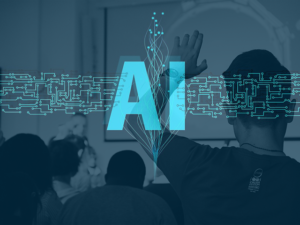Navigating the AI Landscape in Education
Written by Kaitlyn Nolan, First Literacy Marketing and Communications Intern
 The topic of AI has grown immensely in the past few years. In a world increasingly driven by technological advancements, AI has become not only a trending topic, but a look into the future.
The topic of AI has grown immensely in the past few years. In a world increasingly driven by technological advancements, AI has become not only a trending topic, but a look into the future.
Within this technological evolution, one key player has stood out among the most, Chat GPT. This tool is an advanced language model developed by OpenAI that has demonstrated an unprecedented rate of adoption. Statista reports that ChatGPT had one million users within the first five days of launching. This popular AI tool can be used to do a variety of tasks; from coding to planning an itinerary for a trip. It provides opportunities for educational purposes as well, like tutoring and language learning.
As we become more interconnected, students and educators are left at the forefront of this transformative wave. For college students, this new technology may create concerns about bias, privacy, and ethics related to using AI.
Quick Guide for College Students on Using AI With No Bias
It is important to remember that not all technologies affect users equally. Cornell University shares that Large Language Models (LLM’s) analyze data to generate outputs based on learned language patterns. In other words, the responses created by chat bots are generated by the information users have already put in. Therefore, this can potentially lead to biases in some cases. The answers may be inaccurate or misleading. When using AI as a student, it is important to ask these questions to be sure you are using the technology safely:
1. Can other credible sources validate the information?
There is no shame in fact checking! Be sure to look at other credible reports to trust you are receiving accurate information.
2. How does the information generated impact your thinking on this topic?
It can feel like chat bots have a mind and voice of their own. Be sure to stick true to your own ideas and opinions when using AI to brainstorm topics.
3. Is the response inclusive to all perspectives of the topic?
AI has the risk of being biased in some circumstances because of the input-output of information. Be sure to account for all perspectives when researching a topic or idea.
The Future of AI for Students and Educators
The Office of Educational Technology predicts that within five years, AI will change the capabilities of teaching and learning tools. Just as digital literacy is essential in our rapidly evolving technological landscape, AI literacy is important to ensure students and educators are taking advantage of all the good AI has to offer.
For students, there will be countless opportunities that will be added to the job force with ties to AI. Additionally, it is helpful when preparing for a job search. Chat GPT can serve as a helping hand when crafting resumes, cover letters, or drafting professional emails. Utilizing AI in an educational setting can also be helpful for brainstorming project ideas, organizing notes, or generating study materials.
For educators, AI can be used to track a student’s progress, strengths and weaknesses, and it can be helpful to auto grade exams or papers. It can serve as a “AI Agent” that can assist teachers by managing certain secondary objectives within a lesson plan, enabling teachers to focus on more crucial goals in the classroom.
No matter if you are a student or educator, AI is and will continue to be a crucial part of education in the years to come. It is important to educate yourself on AI literacy to create a better understanding of how AI can improve the educational experience.
Looking to dive deeper into the world of AI? Join us for an upcoming workshop for educators facilitated by Andrew Shapira, Enhancing Your Lessons Through the Power of AI.
Students, check out these additional resources to improve your AI IQ.
What is Artificial Intelligence and How Does AI Work?
4 Ways That AI Can Help Students
Embracing Artificial Intelligence in the Classroom
